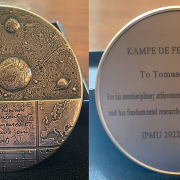On July 11, 2022 at the nineteenth International Conference on Information Processing and Management of Uncertainty in knowledge-based systems (IPMU 2022) in Milan, Italy, Prof. Tomaso Poggio delivered the plenary lecture on "The Science and Engineering of Intelligence." At this time, Prof. Poggio was presented with the Kampe de Feriet award.
The Kampe de Feriet award is given on the occasion of each IPMU Conference.
Previous winners:
- The first recipient was Professor Lotfi A. ZADEH in 1992 at Palma de Mallorca, for his introduction of fuzzy set and possibility theories and his pioneering work on the theory of approximate reasoning.
- In 1994, Professor Ilya PRIGOGINE (Nobel Prize in Chemistry, 1977) received the award for his contributions to the thermodynamics of non-equilibrium. Professor Prigogine was the Director of the International Intitutes of Physics and Chemistry Solvay in Brussels, and of the Center of Statistical Mechanics of the University of Texas at Austin.
- In 1996, the award was presented to Professor Toshiro TERANO, from Tokyo Institute of Technology, for his seminal work on fuzzy control and his role in the emergence of research on intelligent systems.
- In 1998, Professor Kenneth ARROW (Nobel Prize in Economic Science, 1972) received the award for his fundamental work on social choice and collective welfare. Professor Arrow is Joan Kenney Professor of Economics Emeritus and Professor of Operations Research Emeritus at Stanford University.
- In 2000, the recipient was Professor Richard JEFFREY, from Princeton University, for his contributions to the basic foundations in probability.
- In 2002, the recipient of the Kampe de Feriet Award was Professor Arthur DEMPSTER, of Harvard University. Professor Dempster is being recognized for his life long contributions to the field of mathematical statistics as well as his pioneering work which led to the development of the field which has become known as the Dempster-Shafer theory of belief functions.
- In 2004, the award was presented to Professor Janos ACZEL, Distinguished Professor Emeritus of the University of Waterloo (Canada), for his pioneering work on the theory of functional equations, with applications in many fields, such as information measures, index numbers, group decision making, aggregation, production functions, laws of science, theory of measurement and utility theory.
- In 2006, Professor Daniel KAHNEMAN (Nobel Prize in Economic Science, 2002) from Princeton University has received the award for his life long contribution to decision making under uncertainty, prospect theory and the understanding of human judgment in uncertain environments.
- In 2008, the award was presented to Professor Enric TRILLAS (Emeritus researcher, European Centre for Soft Computing) for his contribution to multivalued logics and its underlying role in fuzzy logic. The award also acknowledges his outstanding leadership and contribution to the uncertainty community.
- In 2010, the award was presented to Professor James BEZDEK (Florida, USA), in view of his eminent research contributions to the handling of uncertainty in clustering, data analysis and pattern recognition.
- In 2012, Professor Michio SUGENO (Emeritus Researcher, European Centre for Soft Computing) received the award for fundamental contributions in fuzzy systems modeling and control and the theory of information aggregation.
- In 2014, Professor Vladimir Naumovich VAPNIK (NEC Laboratories in Princeton, USA; Royal Holloway, University of London, UK and Columbia University, USA) has been selected for the Kampé de Fériet Award for his pioneering work on Statistical Learning Theory and his development of the theory of the Support Vector Machine algorithm.
- In 2016, the award was presented to Professor Joseph Y. HALPERN (Cornell University, USA) for his contributions to decision theory and reasoning about knowledge and uncertainty.
- In 2018, Professor Glenn SHAFER (Rutgers Business School–Newark and New Brunswick) received the Kampé de Fériet award for seminal contributions to the mathematical theory of evidence and belief functions as well influential contributions to the field of reasoning under uncertainty
Since 1986, the IPMU Conference has been organized every two years with the aim of bringing together scientists working on various methods for the management of uncertainty in intelligent systems. This conference provides a medium for the exchange of ideas between theoreticians and practitioners using different methods to address the important issue of uncertainty.

